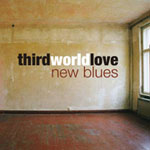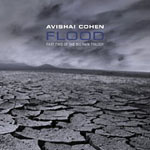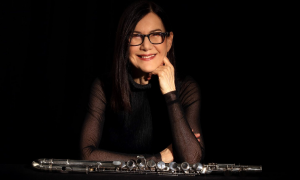Home » Jazz Articles » Interview » Avishai Cohen: Trumpet Trio Makes Strong Mark
Avishai Cohen: Trumpet Trio Makes Strong Mark

Everyone wants to bring out a casual live situation sound in the studio. It sounds like it might be the easiest things to do but, funny enough, it's actually one of the hardest to do.
Early this year, he toured with the

SFJAZZ Collective
band / ensemble / orchestrab.2004
Introducing Triveni (Anzic) came out in the latter part of 2010. On it, Cohen's playing is supple and hip—full of life. Playing over around and through the intricate rhythms of drummer

Nasheet Waits
drumsb.1971

Omer Avital
bass, acousticIt's also a return to a freer, more improvisational kind of music that Cohen likes to dig into. In doing so, Cohen was careful about selecting just the right musicians to bring the music to life. And he was very clear on the concept. So strong were his convictions about the canvass he wanted to paint on, that trumpet trio music recorded previously was scrapped.
"It wasn't the specific sound that I wanted to bring out," says Cohen. "It wasn't like a failed session or anything. It was very good trio playing. It was just not this sound"—the one brought out by Waits and Avital.
Explains the trumpeter, "Omer has his own sound. He has his own time feel, his own approach to music and to jazz. Specifically, in this trio he is also functioning as a second soloist. Omer as a soloist has always been known to come across like he's a horn player, almost. His lines are structured as a horn player, not so much as a bassist. So in a trio setting it works perfect, because he can be the bassist and he can be the second soloist.
"Nasheet absolutely has his own sound, as well. He's raw as a drummer, the freedom that he takes and he gives. That balance between what he takes and what he gives and how we play around with it—that's so unique to him. In the beginning, it was not an easy thing to just jump on. With some drummers, it's easy right away. They keep behind you and you can roll on it. But with Nasheet it's not necessarily the case. It's more challenging, more surprising, more mysterious. Definitely unpredictable. It took me a while to understand his playing and to accept it. I knew it was something I wanted to understand."
That tension is one of the cool things about the music. Avital and Cohen weave in and around the beats of Waits to great effect. Cohen's "Ferrara Napoly," for example, is a slow tempo improvisational groove where Waits' dissimilar steps can clearly be heard. The trumpet is spot on negotiating the tune within those rhythms. The interplay is engaging.
 "He's different than any drummer I ever played with," Cohen says. "He's a force. His drive is absolutely incredible. Nasheet is kind of the unknown. Omer, I'm not saying he's predictable, but he's more in the known section because I've played with him for so many years. In all different configurations. A few of my other projects. A few of his projects. Not to mention Third World Love, a band we've been co-leading for seven years. And he played with the 3 Cohens. And I played with him when I was 12 and he was 16. We played together for the first time when I was a kid back in Israel. So I know him."
"He's different than any drummer I ever played with," Cohen says. "He's a force. His drive is absolutely incredible. Nasheet is kind of the unknown. Omer, I'm not saying he's predictable, but he's more in the known section because I've played with him for so many years. In all different configurations. A few of my other projects. A few of his projects. Not to mention Third World Love, a band we've been co-leading for seven years. And he played with the 3 Cohens. And I played with him when I was 12 and he was 16. We played together for the first time when I was a kid back in Israel. So I know him." "There's not too many records like this," he says. "My first record [The Trumpet Player (Fresh Sound/New Talent, 2003)] was like that. Funnily enough, the reason my first album was like this was because I got some free time in a studio that didn't have a piano. Back then it wasn't so much a concept as a reality situation. But it wasn't a big deal, because I had done it before. Years later, I realized the concept is not so foreign to me. One of my biggest influences is

Miles Davis
trumpet1926 - 1991

Herbie Hancock
pianob.1940

Wayne Shorter
saxophone1933 - 2023
 The new album finds the band exploring a few standards as well. That pretty much happened on-the-spot, and was one of Cohen's goals going into the recording. Prior to starting the trio, he was playing mainly original music in his various projects, a lot of the stuff written and arranged precisely. "I was away from the American songbook, and from swing. It wasn't a main element. I was inspired a lot by West African music, and the music I did was coming from that or inspired by that and swing. But at one point I had a need to play music that has more freedom in it: to go back to explore those standards, songs that are beautiful and are part of my history. I grew up playing as a jazz student in a foreign country. I missed it."
The new album finds the band exploring a few standards as well. That pretty much happened on-the-spot, and was one of Cohen's goals going into the recording. Prior to starting the trio, he was playing mainly original music in his various projects, a lot of the stuff written and arranged precisely. "I was away from the American songbook, and from swing. It wasn't a main element. I was inspired a lot by West African music, and the music I did was coming from that or inspired by that and swing. But at one point I had a need to play music that has more freedom in it: to go back to explore those standards, songs that are beautiful and are part of my history. I grew up playing as a jazz student in a foreign country. I missed it." "I really like to play a slow blues. 'Mood Indigo,' for example. Just take a tune and play it. No planning and no arrangement ... I just wanted to have a different band where I could come to the gig and say, 'Here is a tune.' Go over it in two minutes back stage and play it at the gig. I miss that element. That spontaneity."
Cohen said that he recorded enough material for a second album. He's just waiting for the right time to release it. He also wants to play live more with the group, as their schedules allow. It's a challenge, without the piano, he explains, but one he enjoys experimenting with. "It opens up, it's less predictable. You have more freedom because there is less sound around you. You have to create some kind of texture coming from fewer instruments. Not having a piano there gives you certain harmonic freedom to explore."
Jazz may be the music of exploration, but as Cohen points out, "Some people are not so comfortable with that extra freedom. You already have enough freedom to begin with, with a lot of improvisation going on in jazz. Some people don't want that freedom. Technically or even traditionally. People like certain things. Maybe people don't even like that sound."
Subtract the bassist from a band, for example. "A whole lot of space is opening up on the bottom. Usually the bass holds down the bottom and is the center of the band," he says, "When you take that center out. It's like a balloon. Someone cuts the cord and you want to fly off to the sky, but you can't. So what do you do without that bottom there? Even in your emotional space, you don't have that thing in the bottom. So you have to play around with it to find other ways to fill it, or not to fill it. Some people are not so open to that. It might be too weird or too empty. I like that surprising emptiness that a bass-less trio, for example, gives you."
Cohen was also trying to get a relaxed, live feel to the recording.
 "It sounds like it might be the easiest things to do but, funnily enough, it's actually one of the hardest to do," he explains. "Everyone wants to bring out a casual live situation sound in the studio. But it's rare you can actually do it. Because there are a lot of elements that come in. If you're not prepared. If you haven't recorded much, for example ... It ends up being very strict. You don't take chances. You take less chances in the studio if you're not ready." But he's pleased with the result and his ability to "capture that live sound, that casual, 'Let's just go in and play' ... I knew I was going to play some standards. I didn't know what. "Mood Indigo," I just threw in there. I told Omer, 'You play that part of the melody.' A slight arrangement on the spot, with the tiniest details, but it actually made the whole arrangement. Omer played one line on that melody. I didn't prepare any of the standards ahead of time. I knew that I wanted to play in one room, with no separation and no headphones and try to create the live sound as much as I can, with the elements I have in the studio."
"It sounds like it might be the easiest things to do but, funnily enough, it's actually one of the hardest to do," he explains. "Everyone wants to bring out a casual live situation sound in the studio. But it's rare you can actually do it. Because there are a lot of elements that come in. If you're not prepared. If you haven't recorded much, for example ... It ends up being very strict. You don't take chances. You take less chances in the studio if you're not ready." But he's pleased with the result and his ability to "capture that live sound, that casual, 'Let's just go in and play' ... I knew I was going to play some standards. I didn't know what. "Mood Indigo," I just threw in there. I told Omer, 'You play that part of the melody.' A slight arrangement on the spot, with the tiniest details, but it actually made the whole arrangement. Omer played one line on that melody. I didn't prepare any of the standards ahead of time. I knew that I wanted to play in one room, with no separation and no headphones and try to create the live sound as much as I can, with the elements I have in the studio." As that music circulated, Cohen also said he was very pleased with the SFJAZZ Collective gig. "It's such an inspiring experience. A learning experience, absolutely. Those guys in the band are, first of all, such great people. Fantastic, supportive, egoless bunch of people. Even though it's an all-star band. You might think that won't be the case. It's hard to achieve his kind of attitude in an all-star band. But it happens to be like that. Everyone is so into the music, so respectful of each other. Everyone putting the music as a top priority, as opposed to, 'I need to solo more. I need to play my tune more.' Whatever is the best for the concert, that's what's going on ... It's been a fantastic experience" says Cohen.
Cohen is part of the musical family from Israel that has become well known in the jazz world in recent years. His older sister,

Anat Cohen
clarinetb.1975

Yuval Cohen
saxophoneb.1973

"The 3 Cohens, we're putting a lot of focus on it this year," says the trumpeter. "We played Brazil. And Canada. We had a European tour in January. We played Portland." The siblings also played in New York and Boston in April and will be recording again soon, as well as touring in Australia in June. "The reaction we're getting this year is absolutely fantastic and exciting. It's so nice to have that project. To have this element. It's a unique situation I'm getting to appreciate more and more, as my life goes on. A tour with my brother and my sister. We stay on stage, we play, have fun, joke around and get paid for it," he says, laughing fondly. "Doing what we love doing."
The youngest of the Cohens started playing trumpet at eight, in Tel Aviv. He was exposed to jazz at home, as brother Yuval practiced along with

Charlie Parker
saxophone, alto1920 - 1955
"So I started playing in a big band," he recalls. "They said, 'Ok, in this tune you can play a solo next week.'" Avishai was happy, but unsure. He consulted with Yuval, who wrote out two choruses of a solo for his younger brother to play. He pulled it off. "Everybody said, 'That sounds great. That's killing.'" The sax section was then rehearsed and they had to run the tune down again. Cohen laughs recollecting, "'Wait. What do you mean do it again? I just played it. I can't do it again.' That was the beginning of my life as an improviser, I guess. That was the moment where it started. You have to learn more and more. I'm still learning. You learn every day."
Cohen's trumpet influences in addition to Miles include

Art Farmer
flugelhorn1928 - 1999

Don Cherry
trumpet1936 - 1995

Kenny Dorham
trumpet1924 - 1972

Lee Morgan
trumpet1938 - 1972

Louis Armstrong
trumpet and vocals1901 - 1971

Chet Baker
trumpet and vocals1929 - 1988

Thad Jones
trumpet1923 - 1986

Clifford Brown
trumpetb.1930
At Berklee, Cohen most benefited from meeting other musicians and interacting in the many jam sessions happening there. He already had a strong academic music background. "I studied all that stuff before. It was nice to be there. From a few amazing teachers I had, I did learn a lot," he says, but "I was young. I was kind of eager to get to New York."
 He had been visiting New York City while in college, so he knew what to expect when he left Berklee. The reality of the large city and the music business in general was not a surprise. "When you're younger, you say you're going to come to New York and become a jazz star. The older you get, you realize there's no such thing. It's one experience after the other. You're just trying to stay true to yourself. Every day I'm asking myself, 'What is it that I want from music?' Sometimes, 'What is it that music wants from me?' The more I think about it, the less I know. Because you have preconceived ideas. 'I need to get a better record deal.' You get a little bit stuck in the old school thinking. Get the albums out there. Sell CDs. Then it's 2011. What CDs? Who is going to buy CDs? Who am I putting this album for? It exists. People still buy it, but the reality right now calls for a different type of thinking."
He had been visiting New York City while in college, so he knew what to expect when he left Berklee. The reality of the large city and the music business in general was not a surprise. "When you're younger, you say you're going to come to New York and become a jazz star. The older you get, you realize there's no such thing. It's one experience after the other. You're just trying to stay true to yourself. Every day I'm asking myself, 'What is it that I want from music?' Sometimes, 'What is it that music wants from me?' The more I think about it, the less I know. Because you have preconceived ideas. 'I need to get a better record deal.' You get a little bit stuck in the old school thinking. Get the albums out there. Sell CDs. Then it's 2011. What CDs? Who is going to buy CDs? Who am I putting this album for? It exists. People still buy it, but the reality right now calls for a different type of thinking." Nonetheless, Cohen met with success that has been steadily building. In1997 he placed third in the prestigious Thelonious Monk Jazz Institute Trumpet Competition. In 2003, his first recording as a leader came out, The Trumpet Player (Fresh Sound/New Talent). It's a continuing journey. Cohen is cognizant of that and steadily makes strides.
"You keep learning every day. I go see

Roy Hargrove
trumpet1969 - 2018

Nicholas Payton
trumpetb.1973

Terell Stafford
trumpetb.1966

Sean Jones
trumpetb.1978

Ambrose Akinmusire
trumpetb.1982

Mike Rodriguez
trumpetb.1979
The "jazz star" thing, whatever that may be, isn't really on his radar. Cohen is more practical, aware that the road he and his peers travel is one that is evolving. Jazz requires learning and evolution, but it offers longevity. The environment for music today is one in which what thrills the masses today, does today, and not necessarily next week—or tomorrow.
"It's instant culture," he says. "Everything is instant today.

"You have those TV shows. 'Let's create a band.' You take four chicks. Kind of teach them how to sing. It doesn't really matter if they know how to sing because you can fix that later (in studio). Someone's going to write them the music, someone's going to make the choreography, someone's going to make costumes that look good. Here is the working formula," says Cohen. "The funny thing is that it works. It's the right catchy phrase. It's a hit song. But the artists themselves don't need any time to mature into that. They don't need to mature as a songwriter, because someone's going to write it for them. You don't have to mature as a singer, because they'll fix it later. You don't have to mature as a human being because your audience is not mature. That's why some of them disappear. They're not ready for it.
"But with jazz artists ... a beginner jazz artist in New York has maybe 15 years of practice behind him, relatively. Not to mention when you grow old, you have more. I'm playing for almost a quarter of a century. It's been 25 years since I started playing music. That's a lot of time to put into it. In a funny way, I don't necessarily want to blow it off ... If you get to your peak now, you can only fall from there. You want to grow. You want to play the truth, to play my truth. Whatever I have. To find the best way that I can convey what I have into the horn, into the music, into my compositions. The more I think about it, stardom is something that can easily take you away from that ... I would very much watch out for that 'star is born,' American Idol type of mentality. It's not for me. It's for some people. Unfortunately, it's what people like to see, like to hear."
He adds, "I don't think entertainment should be put out of the equation. I like to see an artist that is an entertainer. I went to see

Hugh Masekela
flugelhorn1939 - 2018
Cohen's musical tastes are not strictly jazz, he notes. ."I like any music that is good music ... I like anything that vibrates. Anything that tells you something. Even in jazz, I like whatever talks to me. It's not that I like all the jazz I hear. Not even close to it. Sometimes I prefer to listen to a good pop song. Or Bob Marley."
 One of his newest projects addresses those feelings, stretches beyond jazz and into rock and funk-type things. He hasn't quite nailed down a name for the band, he says, but it consists of his own trumpet; Yuval Lion and
One of his newest projects addresses those feelings, stretches beyond jazz and into rock and funk-type things. He hasn't quite nailed down a name for the band, he says, but it consists of his own trumpet; Yuval Lion and 
Mark Guiliana
drums
Nir Felder
guitar
Jason Lindner
keyboards "
data-original-title="" title="">Shanir Blumenkranz on bass. The band has played many Sunday nights at Nublu, in New York's East Village. "Everything is electric," he says. "Even the trumpet is electric. This is playing some different standards. A different kind of American songbook.
"
data-original-title="" title="">Shanir Blumenkranz on bass. The band has played many Sunday nights at Nublu, in New York's East Village. "Everything is electric," he says. "Even the trumpet is electric. This is playing some different standards. A different kind of American songbook. 
Led Zeppelin
band / ensemble / orchestrab.1968
"Other than that," says the level-headed trumpet player, he is "just reminding myself every day that I'm healthy. My family's healthy. That's the most important thing. That's something I'm working hard on in my life to remind myself that every day. Because life is short ... I have a lot of places to grow, career-wise. But I guess everything has it's time."
Selected Discography
Avishai Cohen, Introducing Triveni (Anzic, 2010)
SFJAZZ Collective, Live 2010: 7th Annual Concert Tour (SFJAZZ, 2010)
Avishai Cohen, Flood (Anzic, 2008)
Third World Love, New Blues (Anzic, 2008)
3 Cohens, Braid (Anzic, 2007)
Jason Linder Big Band, Live at the Jazz Gallery (Anzic, 2007)
Avishai Cohen, After the Big Rain (Anzic, 2007)
Keren Ann, Keren Ann (EMI France, 2007)
Omer Avital, Arrival (Fresh Sound, 2007)
Third World Love, Sketches of Tel Aviv (Smalls Records, 2006)
Anat Cohen, Noir (Anzic, 2006)
Yuval Cohen, Freedom (Anzic, 2006)
Avishai Cohen, The Trumpet Player (Fresh Sound/New Talent, 2003)
Lemon Juice Quartet, Peasant Songs (Piadrum, 2002)
Lemon Juice Quartet, Republic (Chant, 2000)
Assaf Amdursky, Quiet Engines (NMC Music LTD, 1999)
Photo Credits
Page 1: Courtesy of SFJAZZ
Page 3: Courtesy of Jason Byrne, Red Cat Publicity Page 4: Cees van de Ven
Tags
Comments
PREVIOUS / NEXT
Support All About Jazz
 All About Jazz has been a pillar of jazz since 1995, championing it as an art form and, more importantly, supporting the musicians who make it. Our enduring commitment has made "AAJ" one of the most culturally important websites of its kind, read by hundreds of thousands of fans, musicians and industry figures every month.
All About Jazz has been a pillar of jazz since 1995, championing it as an art form and, more importantly, supporting the musicians who make it. Our enduring commitment has made "AAJ" one of the most culturally important websites of its kind, read by hundreds of thousands of fans, musicians and industry figures every month.







 Buy Now
Buy Now





















